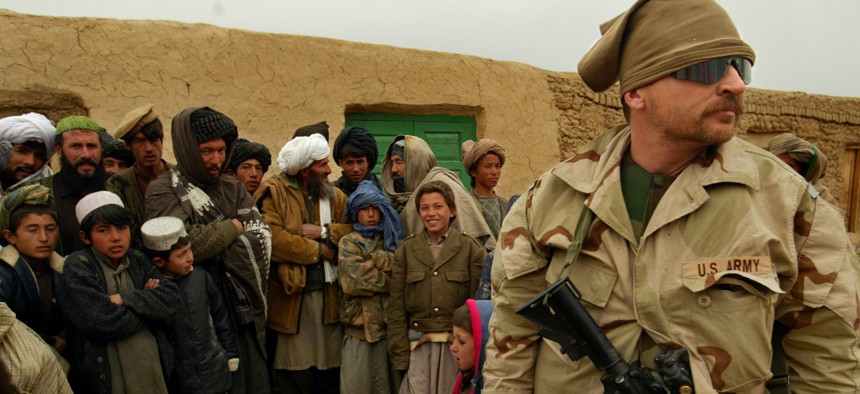
A U.S. Army Special Forces soldier is surrounded by a curious crowd of Afghan onlookers in a remote village in the mountains of western Afghanistan in 2002. Rick Loomis/Los Angeles Times via Getty Images
Between Then and Now, They Did Not Die in Vain
I was among the first to parachute into Afghanistan in 2001. This is how I will remember the war.
Army Capt. Dan Whitten was a young West Point officer serving in Afghanistan when I met him for the first time.
One of his friends noted that he was outgoing and energetic, with enough personal charisma to mount a national campaign. We spent the better part of 2007 and 2008 together in Afghanistan, where he served as my aide-de-camp. Dan was the same age as my two sons and, as they do between people who spend nearly all their time together, our relationship took on many similar qualities. We kept a close relationship after returning from Afghanistan.
In February 2010, while leading a parachute rifle company in Zabul province, Dan was killed in action trying to help evacuate one of his wounded soldiers. He left behind a beautiful young wife, a loving family, and a large contingent of friends and admirers.
I have been thinking hard about Dan and his family in light of the tumultuous events of the last few weeks in Afghanistan, especially with the cacophony of voices pronouncing our efforts over the previous 20 years as a waste of national treasure.
Afghanistan started as a noble mission. I had the opportunity to be among the very first troops on the ground in October 2001. I remember very well the feeling of pride and patriotism as we boarded the aircraft from which we would parachute into southern Afghanistan. With the images of the 9/11 attacks so fresh in our minds, we all felt a sense that this is what our nation needed: an opportunity to strike back at those who attacked us. And we accomplished things. With our intelligence and diplomatic partners, we decimated al-Qaeda, we kept the nation safe from further attack, and we importantly provided hope and opportunity for generations of Afghans.
Our mission in Afghanistan certainly did not turn out the way many of us who served there wished that it would. It is not my intent to litigate that today. I am confident we will analyze this in great detail soon. But I believe our sad ending in Afghanistan can never be allowed to diminish the contributions of so many. I think we must view service and sacrifice in the context in which it is rendered.
Dan Whitten did not die in vain. He did what many heroes before him have done. Dan went to the point of danger, put himself at risk for a fellow soldier, and paid with his life. I can think of nothing more noble or honorable. His sacrifice meant something then, and it does now. Nothing that has transpired in Afghanistan since that day has diminished that one bit.
This sentiment extends to all those who served, were wounded, or now carry the invisible injuries of combat.
I think it is essential for all Americans to appreciate this point as we commemorate this 20th anniversary of the attacks of September 11, 2001. When I went to West Point in 1976, most, if not all, of the military instructors were Vietnam veterans who also served in an unpopular war that did not end the way intended. But that did not diminish the respect and admiration we cadets demonstrated towards them. They were role models and mentors. We learned from their experiences. Their service and sacrifice mattered at the time, just as it does for those who served in Afghanistan, Iraq, or any number of other locations since 9/11.
This anniversary will generate many stories.
First, there is the story of the beginning—the horrific attacks that killed many of our fellow citizens in their workplaces or as they went about their normal daily activities.
And there is a story about the sad ending of a long war that did not achieve all of our desired objectives, and the tortured and painful evacuation from Afghanistan that played out in plain view.
In between is the 20-year story of those who stood up and played their role when their fellow citizens were in peril or need. They fought back aboard aircraft being hijacked. They meticulously recovered their neighbors from the wreckage of the Twin Towers and evacuated their comrades from the ruins of the Pentagon. They cared for grieving families and greeted soldiers returning from war zones. And they served honorably and nobly in far-flung locations when our nation asked them.
Those are the stories I will be thinking about this 9/11.
Retired U.S. Army General Joseph Votel is the president and CEO of Business Executives for National Security, or BENS, and a distinguished fellow at the Middle East Institute.







